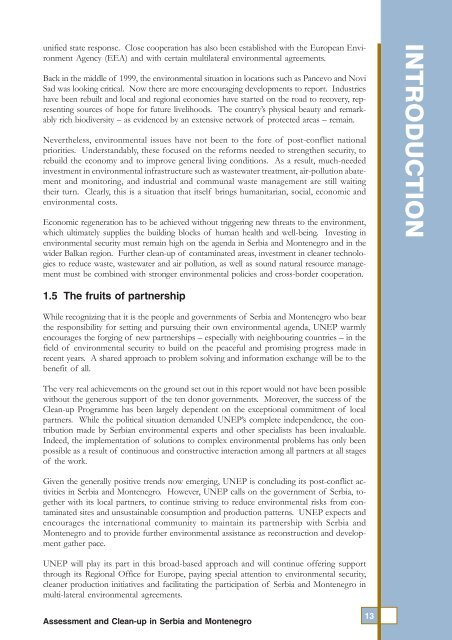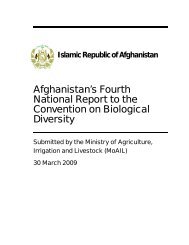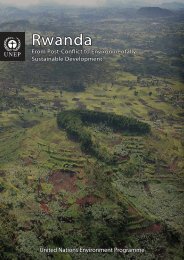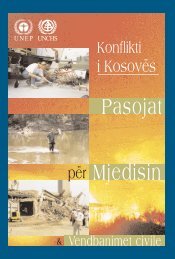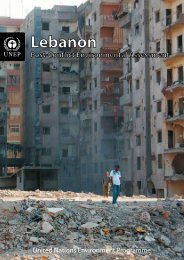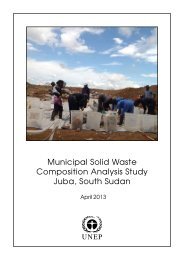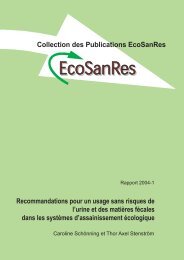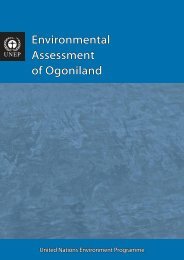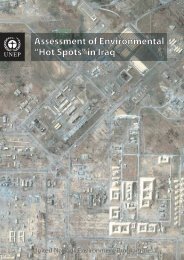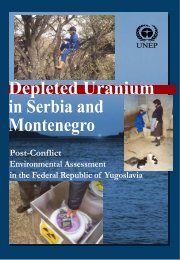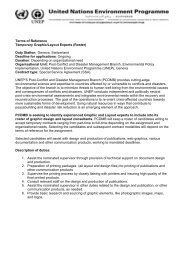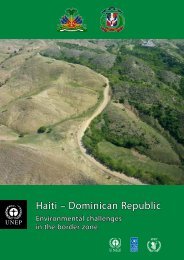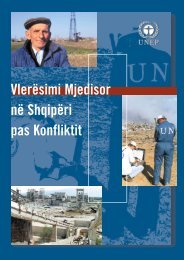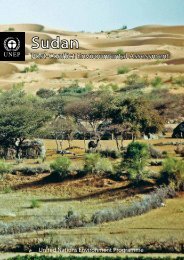From Conflict to Sustainable Development From Conflict to ...
From Conflict to Sustainable Development From Conflict to ...
From Conflict to Sustainable Development From Conflict to ...
You also want an ePaper? Increase the reach of your titles
YUMPU automatically turns print PDFs into web optimized ePapers that Google loves.
unified state response. Close cooperation has also been established with the European Environment<br />
Agency (EEA) and with certain multilateral environmental agreements.<br />
Back in the middle of 1999, the environmental situation in locations such as Pancevo and Novi<br />
Sad was looking critical. Now there are more encouraging developments <strong>to</strong> report. Industries<br />
have been rebuilt and local and regional economies have started on the road <strong>to</strong> recovery, representing<br />
sources of hope for future livelihoods. The country’s physical beauty and remarkably<br />
rich biodiversity – as evidenced by an extensive network of protected areas – remain.<br />
Nevertheless, environmental issues have not been <strong>to</strong> the fore of post-conflict national<br />
priorities. Understandably, these focused on the reforms needed <strong>to</strong> strengthen security, <strong>to</strong><br />
rebuild the economy and <strong>to</strong> improve general living conditions. As a result, much-needed<br />
investment in environmental infrastructure such as wastewater treatment, air-pollution abatement<br />
and moni<strong>to</strong>ring, and industrial and communal waste management are still waiting<br />
their turn. Clearly, this is a situation that itself brings humanitarian, social, economic and<br />
environmental costs.<br />
Economic regeneration has <strong>to</strong> be achieved without triggering new threats <strong>to</strong> the environment,<br />
which ultimately supplies the building blocks of human health and well-being. Investing in<br />
environmental security must remain high on the agenda in Serbia and Montenegro and in the<br />
wider Balkan region. Further clean-up of contaminated areas, investment in cleaner technologies<br />
<strong>to</strong> reduce waste, wastewater and air pollution, as well as sound natural resource management<br />
must be combined with stronger environmental policies and cross-border cooperation.<br />
INTRODUCTION<br />
1.5 The fruits of partnership<br />
While recognizing that it is the people and governments of Serbia and Montenegro who bear<br />
the responsibility for setting and pursuing their own environmental agenda, UNEP warmly<br />
encourages the forging of new partnerships – especially with neighbouring countries – in the<br />
field of environmental security <strong>to</strong> build on the peaceful and promising progress made in<br />
recent years. A shared approach <strong>to</strong> problem solving and information exchange will be <strong>to</strong> the<br />
benefit of all.<br />
The very real achievements on the ground set out in this report would not have been possible<br />
without the generous support of the ten donor governments. Moreover, the success of the<br />
Clean-up Programme has been largely dependent on the exceptional commitment of local<br />
partners. While the political situation demanded UNEP’s complete independence, the contribution<br />
made by Serbian environmental experts and other specialists has been invaluable.<br />
Indeed, the implementation of solutions <strong>to</strong> complex environmental problems has only been<br />
possible as a result of continuous and constructive interaction among all partners at all stages<br />
of the work.<br />
Given the generally positive trends now emerging, UNEP is concluding its post-conflict activities<br />
in Serbia and Montenegro. However, UNEP calls on the government of Serbia, <strong>to</strong>gether<br />
with its local partners, <strong>to</strong> continue striving <strong>to</strong> reduce environmental risks from contaminated<br />
sites and unsustainable consumption and production patterns. UNEP expects and<br />
encourages the international community <strong>to</strong> maintain its partnership with Serbia and<br />
Montenegro and <strong>to</strong> provide further environmental assistance as reconstruction and development<br />
gather pace.<br />
UNEP will play its part in this broad-based approach and will continue offering support<br />
through its Regional Office for Europe, paying special attention <strong>to</strong> environmental security,<br />
cleaner production initiatives and facilitating the participation of Serbia and Montenegro in<br />
multi-lateral environmental agreements.<br />
Assessment and Clean-up in Serbia and Montenegro<br />
13


